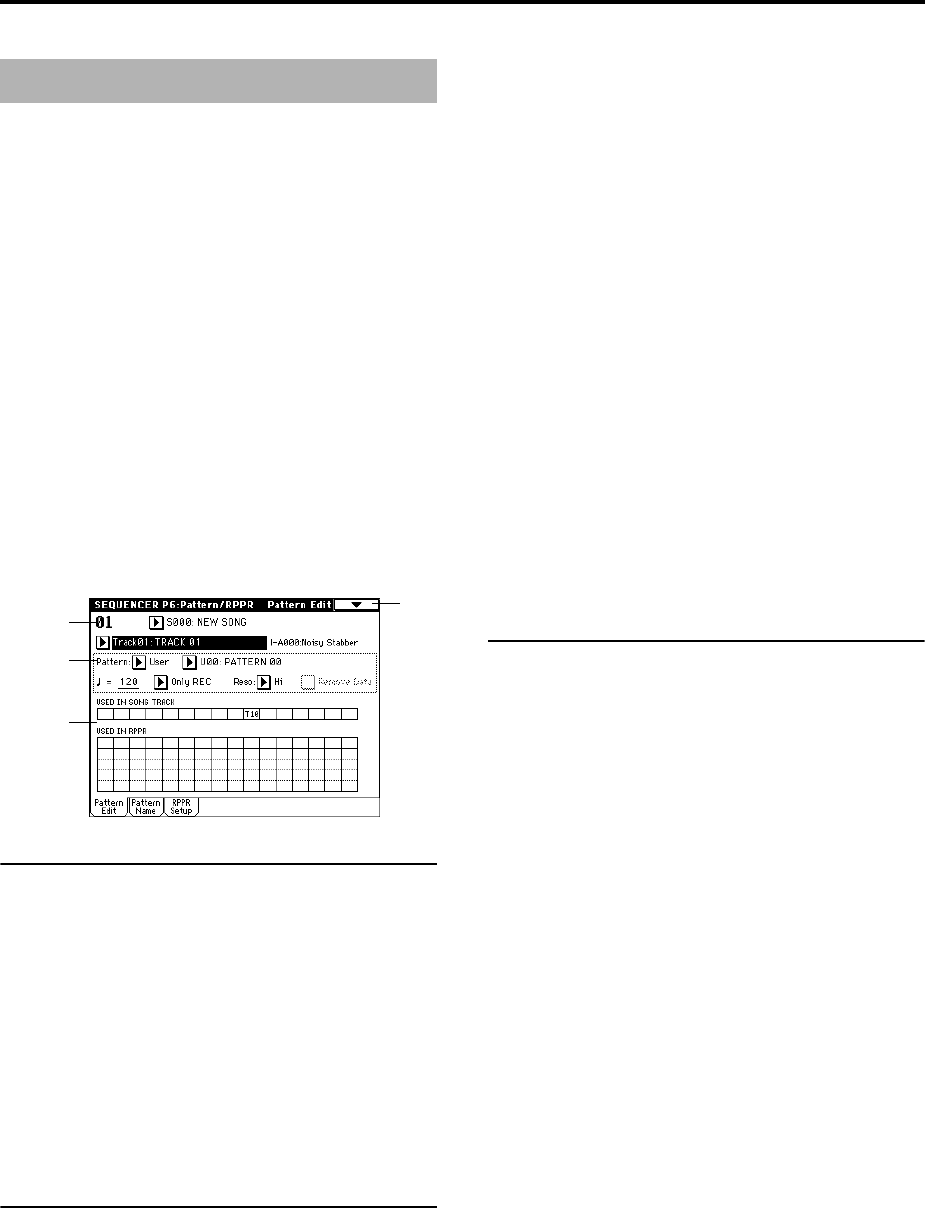
76
On the TRITON STUDIO you can use preset patterns P000–
149, and user patterns U00–99. One song can contain up to
one hundred user patterns. Preset patterns suitable for use
in a drum track are provided in memory, and can be selected
from any song.
Preset patterns cannot be edited, but you may copy a preset
pattern to a user pattern, and edit.
User patterns can be created by realtime recording (includ-
ing recording that uses the arpeggiator), step recording, the
Get From Track command (obtaining data from a track), or
the Copy Pattern command (copying from another pattern)
(☞BG p.86).
These patterns can be assigned to each key by the RPPR
(Realtime Pattern Play/Recording) function and played by
pressing a single key, and the resulting performance can be
recorded on the sequencer (☞RPPR Setup page).
6–1: Pattern Edit
Here you can record a pattern, edit it, and assign it to a track
in a song.
6–1a: Location, Song Select, Track Select
Location [01...99]
Displays the current measure location of the selected pat-
tern.
Song Select [000...199: name]
Selects a song.
The user pattern will be created in the song you select.
Track Select [Track01...Track16, Master Track]
Selects the track that will be used to record/play the pattern
data. The pattern data will be recorded/played using the
settings of the track you select. The area at the right displays
the program bank, number, and name for the selected track.
6–1b: Pattern, Pattern Select, Tempo, Metronome
Sound, Reso, Remove Data
If you wish to record pattern data, use “Pattern” and “Pat-
tern Select” to select a user pattern and pattern number.
Next, use the “Pattern Parameter” page menu command to
set the number of measures in the pattern and its time signa-
ture. Then you can perform realtime recording in the Pattern
Edit page, or step recording by using the “Step Recording
(Loop Type)” page menu command. Finally, use page menu
commands as desired to perform event editing or other
types of editing.
Pattern (Pattern Bank) [Preset, User]
Selects the type of pattern.
If Preset is selected, it will not be possible to record. You will
be able to select and execute the “Copy Pattern,” “Bounce
Pattern,” “Put to Track,” and “Copy to Track” page menu
commands.
Pattern Select [P000...149, U00...U99]
Selects a pattern. User patterns can be renamed in the Pat-
tern Name page.
(Tempo) [040...240, EXT]
Specifies the playback tempo of the pattern. (☞0–1a).
Metronome Sound [Only REC, REC & Play, Off]
Specifies whether the metronome will sound during record-
ing or playback. (☞0–8b, “Sound,” “Metronome Setup”)
Reso (Resolution) [Hi, 3 … ]
Specifies how the timing of the data being recorded into the
pattern will be corrected. (☞0–1a “Reso (Resolution).”)
Remove Data [Off, On]
On (checked): Unwanted performance data can be
removed during pattern recording. The procedure is the
same as explained in “Remove Data” of Loop All Tracks.
(☞0–8a)
6–1c: USED IN SONG TRACK, USED IN RPPR
USED IN SONG TRACK
This area indicates the song tracks in which the selected pat-
tern is used.
USED IN RPPR
This area indicates the RPPR in which the selected pattern is
used. The assigned key and the specified track are shown.
How to record a user pattern
1 Use “Song Select” to select the song in which you want to
create a user pattern.
2 Use “Track Select” to select the sound that you will
record.
The pattern you record will sound according to your
choice in “Track Select.”
3 Use “Pattern Bank” and “Pattern Select” to select User
pattern and the desired pattern number.
4 Select the page menu command “Pattern Parameter,”
and in the dialog box, specify the number of measures
and time signature of the pattern.
5 Check the tempo in “”.
6 If you want to record in realtime, set “Reso” to specify
the resolution, and press the SEQUENCER [REC/
WRITE] key and then the [START/STOP] key to begin
recording.
When you finish recording to the end of the measures
specified by “Pattern Parameter,” you will return to the
first measure, and can continue recording while adding
more material. (☞”Loop All Tracks” 0–8a)
If you want to perform step recording, select the page
menu command “Step Recording (Loop Type)” to access
the dialog box, and record.
Sequencer P6: Pattern/RPPR
6–1
6–1a
6–1b
6–1c
